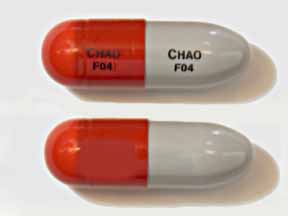Seromycin
Generic name: cycloserine [ SYE-kloe-SER-een ]
Drug class: Streptomyces derivatives
What is Seromycin?
Seromycin is an antibiotic that is used to treat tuberculosis (TB).
Seromycin is also used to treat bladder or kidney infections.
Seromycin is usually given after other medications did not work or have stopped working.
Seromycin may also be used for purposes not listed in this medication guide.
Seromycin side effects
Get emergency medical help if you have signs of an allergic reaction: hives; difficult breathing; swelling of your face, lips, tongue, or throat.
Seromycin may cause serious side effects. Call your doctor at once if you have:
-
a seizure;
-
confusion, depressed mood, unusual thoughts or behavior;
-
severe drowsiness, severe dizziness or spinning sensation;
-
swelling, rapid weight gain;
-
overactive reflexes, tremors or shaking;
-
trouble speaking; or
-
muscle weakness.
Common side effects of Seromycin may include:
-
dizziness, drowsiness;
-
mood changes;
-
headache; or
-
numbness, tingling, burning pain.
This is not a complete list of side effects and others may occur. Call your doctor for medical advice about side effects. You may report side effects to FDA at 1-800-FDA-1088.
Related/similar drugs
Warnings
Follow all directions on your medicine label and package. Tell each of your healthcare providers about all your medical conditions, allergies, and all medicines you use.
Before taking this medicine
You should not use Seromycin if you are allergic to it, or if you have:
-
epilepsy or other seizure disorder;
-
depression, anxiety, or mental illness;
-
severe kidney disease; or
-
if you drink large amounts of alcohol.
Seromycin is not approved for use by anyone younger than 18 years old.
Tell your doctor if you have ever had:
-
a seizure; or
-
kidney problems.
It is not known whether Seromycin will harm an unborn baby. Tell your doctor if you are pregnant or plan to become pregnant.
You should not breast-feed while using Seromycin.
How should I take Seromycin?
Your doctor will perform a blood test to make sure Seromycin is the right treatment for your condition.
Follow all directions on your prescription label and read all medication guides or instruction sheets. Your doctor may occasionally change your dose. Use the medicine exactly as directed.
Use this medicine for the full prescribed length of time, even if your symptoms quickly improve. Skipping doses can increase your risk of infection that is resistant to medication. Seromycin will not treat a viral infection such as the flu or a common cold.
You will need frequent medical tests.
Tuberculosis is often treated with a combination of medications. Use all medications as directed and read all medication guides you receive. Do not change your dose or dosing schedule without your doctor's advice.
Store at room temperature away from moisture and heat.
What happens if I miss a dose?
Take the medicine as soon as you can, but skip the missed dose if it is almost time for your next dose. Do not take two doses at one time.
What happens if I overdose?
Seek emergency medical attention or call the Poison Help line at 1-800-222-1222.
Overdose symptoms may include confusion, severe drowsiness, tingly feeling, problems with muscle movement, slurred speech, seizure, or loss of consciousness.
What should I avoid while taking Seromycin?
Avoid drinking alcohol. It may increase your risk of seizures or other side effects.
Avoid driving or hazardous activity until you know how Seromycin will affect you. Your reactions could be impaired.
What other drugs will affect Seromycin?
Tell your doctor about all your other medicines, especially:
-
ethionamide; or
This list is not complete. Other drugs may affect Seromycin, including prescription and over-the-counter medicines, vitamins, and herbal products. Not all possible drug interactions are listed here.
More about Seromycin (cycloserine)
- Check interactions
- Compare alternatives
- Drug images
- Side effects
- Dosage information
- During pregnancy
- Drug class: streptomyces derivatives
- Breastfeeding
Patient resources
Professional resources
Related treatment guides
Further information
Remember, keep this and all other medicines out of the reach of children, never share your medicines with others, and use this medication only for the indication prescribed.
Always consult your healthcare provider to ensure the information displayed on this page applies to your personal circumstances.
Copyright 1996-2025 Cerner Multum, Inc. Version: 6.01.

